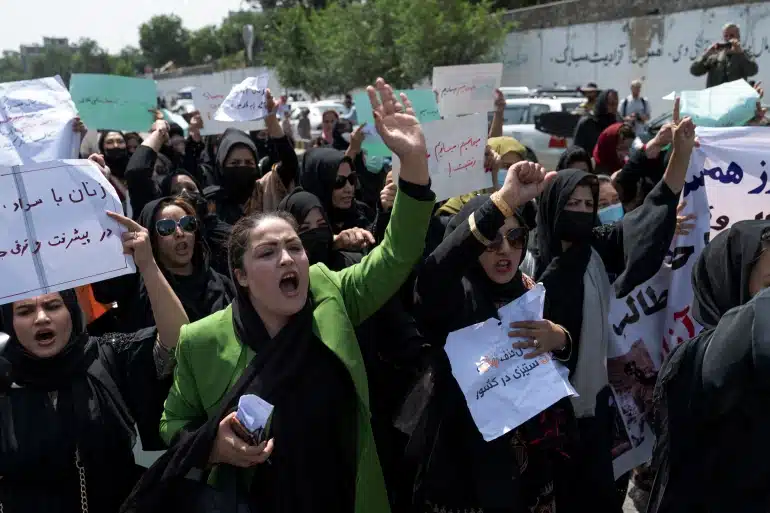In the early hours of Saturday, around 40 women marched on the education ministry in Kabul , chanting “bread, work and freedom” to protest for their right to work and freedom. They chanted slogans, raised banners, and danced in unison. The scene was peaceful until the moment a group of Taliban fighters began shooting at them from rooftops, shattering windows and sending people running for cover.
The status of women in Afghanistan has been disputed since the formation of the modern state. Afghan women were granted the right to vote in 1919, and were the first in the Muslim world to do so; however, their role in political life remained extremely limited, and women’s rights were not a significant issue. In Kabul, women earned the right to work outside the home, but other areas of the country did not benefit from these urban reforms. Although the Soviet invasion in 1979 ushered in greater opportunities for women, they became increasingly marginalized after the rise of the Taliban in 1996. The Taliban imposed a harsh interpretation of Islamic law, which denied women their rights as citizens and treated them as second-class members of society. During the Taliban rule, women were not allowed to study, work, or leave the house without a male relative. They were prevented from obtaining an education, and their right to work outside the home was not recognized. Women who attempted to report or resist the Taliban’s restrictions on their civil rights were punished severely.
Under the last year of Talian rule, women and girls continue to face restrictions on their basic human rights as the Taliban believes educating women goes against Islam, wearing the hijab is now required and enforced, and women can’t go to work or travel freely without a male guardian. Afghan women were promised the right to pursue education and employment under the Taliban’s interpretation of Islamic law, but the group has failed to deliver.
Women’s access to health services remains extremely low, and the use of sharia law in the civil court system has placed women at a significant disadvantage in divorce and custody proceedings. Although the government made some effort to enforce the protection of women’s rights following the August 2022 protests, the Taliban has shown no interest in respecting women’s civil rights. Despite the presence of some moderate voices in the Taliban, most members of the movement remain committed to fighting jihad in Afghanistan, and they have no intention of negotiating with the government.
Hundreds of thousands of girls and young women have missed out on school since the Taliban takeover. In September 2021, the Taliban ordered the reopening of secondary schools, but only for male teachers and students without mentioning women and girls — seen as a de facto ban reversing years of gender equality process. Some schools reopened for girls in certain provinces due to public pressure, but the vast majority of schools in the country remained closed.
The Taliban has repeatedly ignored the plight of Afghan women since the fall of the Taliban in 2001. However, the violent dispersal of the August 2022 protests shows the Taliban’s contempt for the international community’s efforts to promote women’s rights in Afghanistan. The Taliban has shown little sign that they are willing to respect women’s rights. The Taliban’s lack of commitment to women’s rights has impeded progress in Afghanistan and has increased the risk of continued violence.
Image Credit: Wakil Kohsar/AFP



















